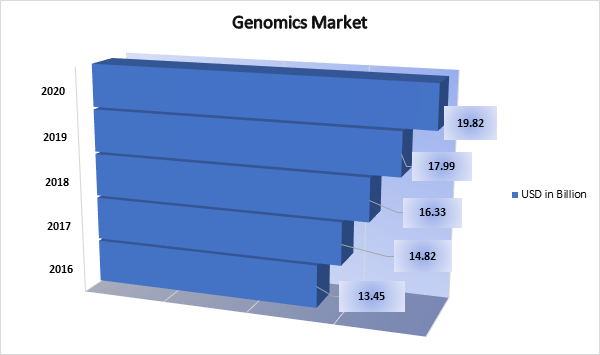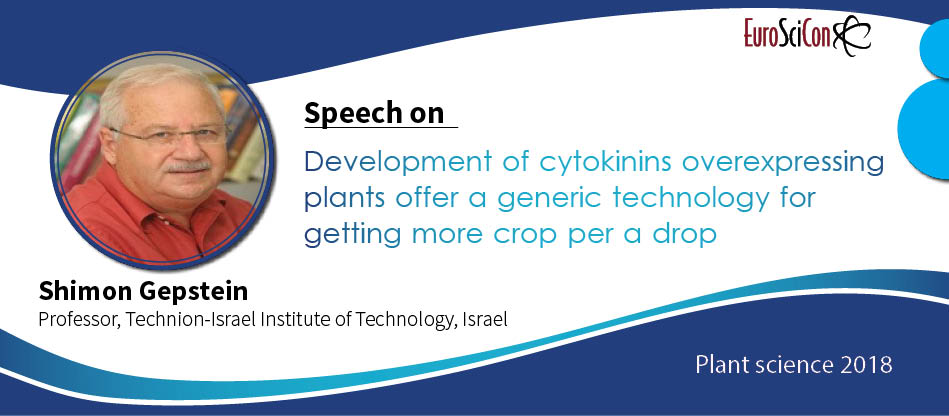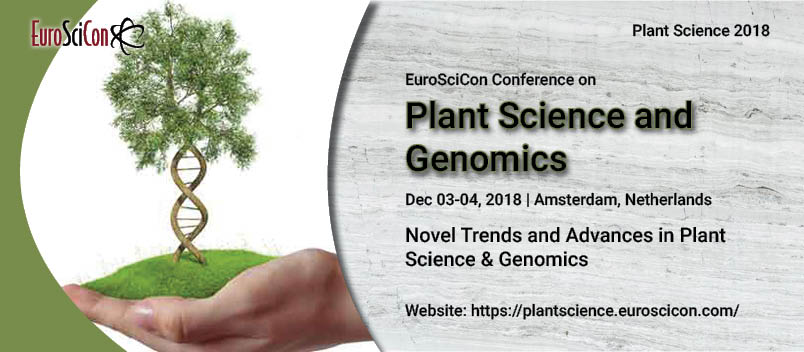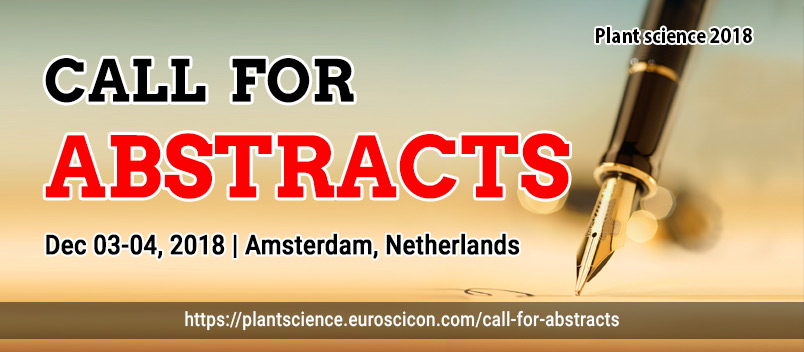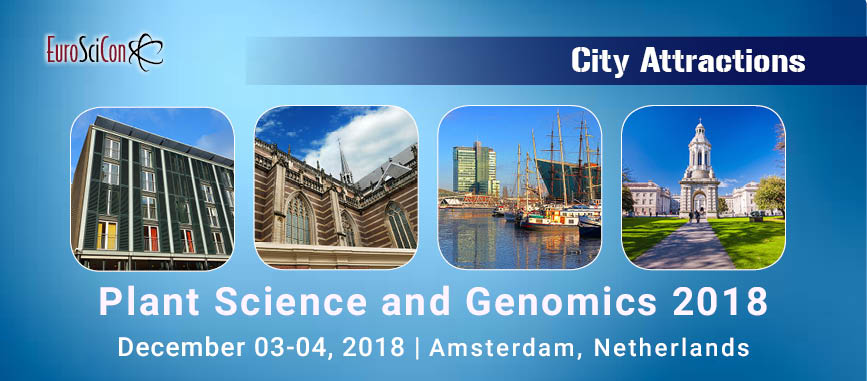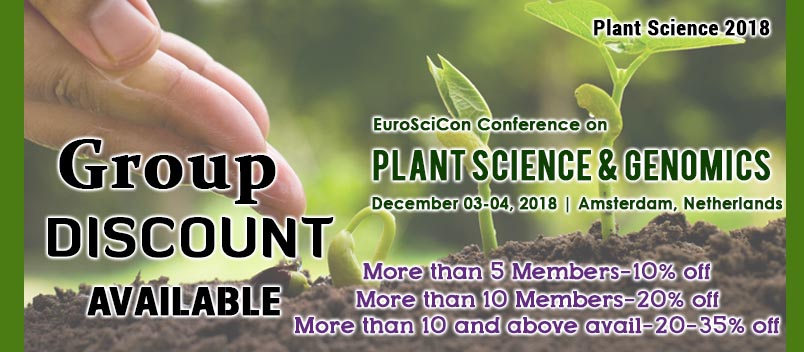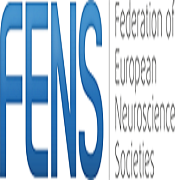Plant Science 2018
About Conference
Plant Science and Genomics Conferences
EuroSciCon warmly respects each one of the individuals and supporters from worldwide to attend "EuroSciCon Conference on Plant Science & Genomics” amid December 03-04, 2018 in Amsterdam, Netherlands. This International Plant Science Conference overwhelmingly emphasis on “Novel Trends and Advances in Plant Science & Genomics”.
With people from around the world focused on discovering and finding out about Plant Science and its advances; this is your most obvious opportunity to accomplish the greatest exhibit of members from the Plant Science and Physiology Societies. Lead presentations by introductions, pass on data on new research, meet with present and potential specialists and researchers, make a sprinkle with new movements, improvements and progressions, also we get name acknowledgment at this 2-day occasion. Generally acclaimed speakers all through the world, the most recent methodologies, headways, and the most current updates in Plant Science are indications of this social affair at this regarded gathering.
The Study of Plant Science, Plant Pathology, Plant Genomics, Plant Physiology, development, digestion and propagation in living plants and investigates the concoction forms inside and identified with living creatures and some huge procedure, for example, photosynthesis, breath, plant nourishment, plant hormone capacities, tropisms, photograph morphogenesis, ecological physiology (plant maladies), seed germination, torpidity and diverse stomata capacity and transpiration, plant water relations. Plant organic chemistry is identified with sub-atomic science, for example, micromolecules and plant digestion systems, Biomolecules, sugars, amino corrosive, lipids.
These Plant Science Conferences proceedings include symposiums and workshops, keynote speeches, plenary talks, poster sessions and panel discussion on latest research developments in the field of plant science and genomics.
Euroscicon are corporate members of the following organisations
Royal Society of Biology
IBMS
British Society for Immunology
Rare Care UK
Opportunities for Conference Attendees
For Researchers &Faculty:
Speaker Presentations
Poster Display
Symposium hosting
Workshop organizing
For Universities, Associations & Societies:
Association Partnering
Collaboration proposals
Academic Partnering
Group Participation
For Students & Research Scholars:
Poster Competition (Winner will get Best Poster Award)
Young Researcher Forum (YRF Award to the best presenter)
Student Attendee
Group registrations
For Business Delegates:
Speaker Presentations
Symposium hosting
Book Launch event
Networking opportunities
Audience participation
For Companies:
Exhibitor and Vendor booths
Sponsorships opportunities
Product launch
Workshop organizing
Scientific Partnering
Marketing and Networking with clients
Euroscicon organizes International Nutrition Meetings annually across Europe, Austria, Ireland, Germany, France, Liechtenstein, Lithuania, Finland, Luxembourg, Hungary, Italy, Norway, Poland, Denmark, Macedonia, Greece, Portugal, Romania, Czech Republic, Switzerland, United Kingdom, Belgium, Scotland, Latvia, Ukraine, Sweden, Denmark, Spain, Netherlands Russia, Bulgaria, France, with solitary subject of quickening logical revelations.
Tracks:
Plant Science
Plant Genomics
Plant Structure: Cytology, Morphology & Anatomy
Plant Growth & Development: Epigenetics
Plant Genetics, Breeding, and Biotechnology
Plant Physiology & Biochemistry
Plant Tissue Culture
Plant Pathology and Microbiology
Plant Nanotechnology
Plant Taxonomy and Systematics
Pharming and Transgenic Plants
Agronomy, Soil and Crop sciences
Horticulture and Landscape Architecture
Sessions and Tracks
Track-1: Plant Science, Photosynthesis and Natural Products
Plant Sciences is the examination of plant improvement, proliferation, headway, and change, and the use of plants for sustenance, fiber, and favor purposes. , the grouping of available courses and research openings enables a unimaginable nice assortment of individual interests and livelihood ways. Furthermore, this understudy grabs the dominance vital to drive ask about in and address various neighborhood, regional, and overall difficulties. Plant Science is revolved around the inherited and cell control of plant advancement and change in indicate species, crops and their wild relatives using, genomics, proteomics, systems science and impelled light microscopy. Plant Science specialization is expected to give understudies an appreciation of how plants function, scaling from the molecule to the natural framework and how this limit bolsters the execution of plants in ordinary and agrarian conditions. It is an important grouping of coherent research activity at ANU, crossing everything from the limit, essentialness, coordinated efforts, genetic characteristics and showing of plants and their environment. In this specialization understudies are displayed to cutting edge disciplinary research and investigators, which collects commitment, understanding and examination of force issues in plant science.
Photosynthesis is a procedure utilized by plants and different creatures to change over light vitality into substance vitality that can later be discharged to fuel the life forms' exercises (vitality change). This substance vitality is put away in starch atoms, for example, sugars, which are integrated from carbon dioxide and water
A characteristic item is a concoction compound or substance created by plants—that is, found in nature. In the broadest sense, common items incorporate any substance delivered by life are the natural products
- Plant Morphology and Plant Metabolism
- Medicinal and Aromatic Plant Sciences
- Soil Science and Soil-Plant Nutrition
- Agricultural Science
- Plant Physiology and Biochemistry
- Seed Science and Technology
- Hormones, Antibodies, Antigens and Antibiotics
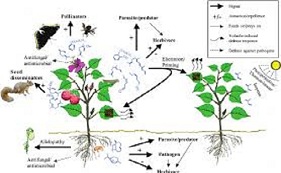
Track-2: Plant Genomics and Biotechnology
Plant genomics and biotechnology is the field of cutting edge science that enables researcher to look at various numbers of qualities and to comprehend the hereditary design of plant genomes and separate the qualities in charge of transformations. It includes in sequencing and investigation of plant genome. It additionally helps in keeping up the huge number of database that helps us to think about hereditary variety and to grow new plant write
- Cereal Genomics
- Plant Science Meeting
- Plant genomics scope in Europe
- Sequencing
- Transcriptomics
- Proteomics
- Molecular marker development / Marker assisted selection

Track-3: Plant Tissue Culture
Plant tissue culture is the strategy of developing and keeping up plant cells, tissues or organs particularly on simulated medium in appropriate holders under controlled ecological conditions. Any piece of a plant is taken out which is known as explant and developed in a test tube under sterile conditions. Cell division from explant frames callus which can be developed into another new plant. Plantlets can be recovered by tissue refined which includes different strategies, for example, immunization, hatching, recovery and solidifying. Transgenic plants can likewise be built by tissue refined methods. Micropropagation is an incorporated procedure which likewise includes in recovery of plants by different techniques, for example, Multiplication by Adventitious Shoots, Axillary Buds and Apical Shoots, Multiplication Through Callus Culture, Organogenesis and Somatic Embryogenesis
- Micropropagation in plants
- Applications of Plant Tissue Culture
- Callus and susupension Culture
- Embryo Culture
- Regeneration of Plantlets
- Somatic Hybridisation
- Resistance to weedicites
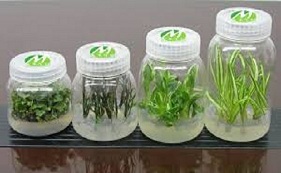
Track-4: Plant Pathology, Micro-Biology and Mycology
The science that arrangements with the investigation of illnesses of plants, their improvement and control are called Plant Pathology. Plant Pathology is characterized as the investigation of the life forms and ecological conditions that reason illness in plants, the systems by which this happens, the associations between these causal operators and the plant (consequences for plant development, yield and quality), and the strategies for overseeing or controlling plant sickness. Plant sicknesses are caused by biotic operators like growths, microscopic organisms, actinomycets, Mycoplasma, infections, nematodes, and blossoming parasites or by abiotic like ominous natural conditions or healthful lacks. Investigation of plant pathology incorporates the investigation of sciences viz, Microbiology, Bacteriology, Virology, Mycology, Nematology, protozoology, phycology, troublesome, ecological variables, healthful lacks and blossoming plant parasites
- Insect Plant Interactions
- Microbial Genomics
- Plant Environment Interaction
- Fungal Plant Interaction
- Nutrition Improvement
- Plant Immune Response
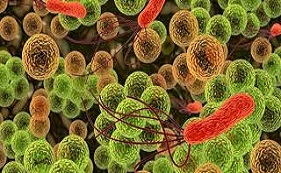
Track-5: Plant Nanotechnology
The agronomic utilization of nanotechnology in plants (phyto-nanotechnology) can possibly adjust ordinary plant creation frameworks, taking into consideration the controlled arrival of agrochemicals (e.g., composts, pesticides, and herbicides) and target-particular conveyance of biomolecules (e.g., nucleotides, proteins, and activators).
An enhanced comprehension of the collaborations between nanoparticles (NPs) and plant reactions, including their take-up, confinement, and action, could reform edit generation through expanded infection protection, supplement use, and product yield. Nano agribusiness includes the work of Nano particles in farming these particles will grant some useful impacts to crops.
The rise of nanotechnology and the improvement of new Nano gadgets and Nanomaterial are open up potential novel applications in agribusiness and biotechnology. Nanoparticles are materials that are sufficiently little to fall inside the Nano metric range, with no less than one of their measurements being not as much as a couple of hundred nanometres. These materials would discharge pesticides or composts at a particular time and focused on area. Nanoparticles labeled to agrochemicals or different substances could decrease the harm to other plant tissues and the measure of chemicals discharged into the earth.
- Green nanotechnology
- Agriculture nanotoxicology
- Uptake and Translocation of Nanoparticles in plants
- Effects of Nanoparticles on plant growth and development
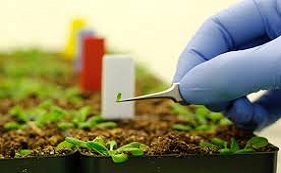
Track-6: Plant Genetics and epigenetics
Plants grew continuously experienced hereditary and epigenetic controlling frameworks to react quickly to horrible natural conditions, for example, warm, cool, dry spell, and pathogen contaminations. Specifically, warm extraordinarily influences plant development and advancement, resistance and circadian musicality, and represents a genuine risk to the worldwide sustenance supply. Transgenes give off an impression of being especially touchy to epigenetic variety which can prompt transgene quieting, i.e. the total or halfway inactivation of transgene articulation. Plants are perfect model frameworks to contemplate the impact of changing ecological conditions on epigenetic designs. We are particularly intrigued to see how certain genomic districts move toward becoming focuses for epigenetic change and how ecological pressure influences epigenetic quality direction. Our connected work explores how transgene hushing can be averted and how epigenetic variety can be abused for novel rearing techniques
- Epigenetics and DNA methylation studies
- Disease and stress resistance
- miRNA and RNA analysis
- Genetic conferences
- Plant breeding methods
- Pathogen detection and analysis
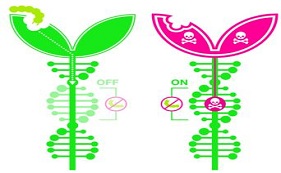
Track-7: Plant Breeding and Molecular Breeding
Plant reproducing is the study of expanding constructive hereditary characteristics in plants that individuals develop. It comprises of explanatory systems that enable specialists to make and select plants that are reliably exceptional in wanted characteristics. The focal target in plant reproducing is to enhance the hereditary premise of business edit species to conform to changing requests on yield and quality. Measurements assumes a key part in present day plant reproducing. A traditional quantitative hereditary model composes the phenotype as a result of hereditary, natural and genotype by condition connection impacts. In the genomic time, this established model has been broadened and summed up. Direct blended models assumed a vital part in traditional quantitative hereditary qualities and still do as such in present day.
- Plant Molecular Assisted Breeding
- Marker Development
- Genetic Modification
- Signal Transduction
- Molecular Marker
- Mapping of Genes
- Mutagenesis in Plant Breeding
- Polyploidy in Plant Breeding
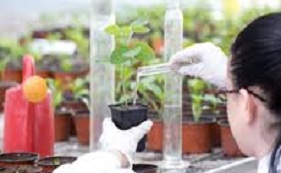
Track-8: Plant Engineering Technologies
Present day approach in plant engineering technologies (GE) has made it conceivable to precisely adjust DNA successions in plant cells, furnishing particularly built plants with attributes of intrigue. Quality focusing on proficiency turns on the conveyance technique for both arrangement particular nucleases and repair formats, to plant cells.
- Plant Genome Engineering and Plant genetic diversity
- Improving gene editing technology, enzymes, and methods
- Genome editing applications using new techniques
- Genome editing and the latest EU policies
- Genome / DNA assembly for editing
- Plant Genetic Engineering and GM crops
- Plant Gene Editing for the Consumer
- Plant engineering and its Applications in Cereals

Track-9: Plant Genome Sciences and Sequencing
Genome Sequencing is the way toward deciding the total DNA succession of a living being's genome at a solitary time. This involves sequencing the greater part of a living being's chromosomal DNA and additionally DNA contained in the mitochondria and, for plants, in the chloroplast. It is fundamentally making sense of the request of DNA nucleotides, or bases, in a genome—the request of As, Cs, Gs, and Ts that make up a life form's DNA. Plant Genomics scientists have promptly grasped new calculations, advances and ways to deal with produce genome, transcriptome and epigenome datasets for model and product species that have allowed profound deductions into plant science. At the point when an animal varieties' reference genome is accessible, entire genome resequencing is an effective approach for finding qualities, SNPs, and basic variations, while at the same time deciding genotypes. Data from these examinations will fill in the holes that exist in the hereditary maps of numerous plant species, enhancing plant reproducing and determination, and empowering complete similar genomic investigations inside and crosswise over species and couple of affiliations incorporates
- Protein Engineering
- Drug Development and design
- SNPs
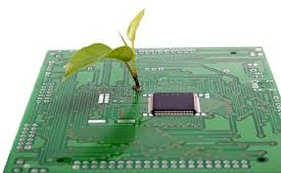
Track-10: Plant Synthetic Biology and Plant Transcriptome
Plant Synthetic Biology is an unmistakable field that structures building standards with the plant science towards the creation and outline of new gadgets. This field should assume a critical part in the agribusiness for customary harvest change, and empowers novel bio creation in plants. Explanation is the way toward distinguishing and portraying the areas of natural enthusiasm inside a genome.The area and structure of protein-coding qualities is the most widely recognized type of comment, yet different sorts of imperative succession comment incorporate the ID of noncoding RNAs like tRNA ,rRNA, tedious arrangements, for example, transposable components, and the area of hereditary markers. Utilitarian explanation depicts the organic setting of quality successions.
- Plant Genome Annotation
- Plant Gene Family Database
- Plant Synthetic Biology
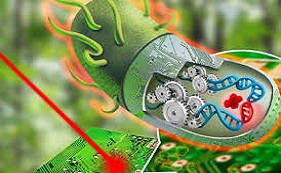
Track-11: Agrobacterium
In view of authentic information, it can be expressed that the "Agrobacterium science in Ghent" is commending its 50th commemoration in 2018. To be sure, in 1968, Jeff Schell was designated educator at the staff of Sciences at Ghent University and he chose to fabricate an examination group by intertwining with the unit of Marc van Montagu in the Medical School. At that point in 1973, by a purposeful exertion of the two gatherings, the Ti plasmid was found as containing the changing guideline which was exchanged from Agrobacterium to the plant cell, bringing about non-controlled plant cell development and crown bothers; this pulled in a great deal of enthusiasm just like the main instance of level quality exchange amongst prokaryotes and eukaryotes.
- Agrobacterium: a disease-causing bacterium
- Agrobacterium and plant biotechnology
- The Agrobacterium tumefaciens C58 genome
- Agrobacterium—taxonomy of plant-pathogenic Rhizobium species
- Production of a mobile T-DNA by Agrobacterium Tumefaciens
- Translocation of oncogenic T-DNA and effector proteins to plant cells
- Intracellular transport of Agrobacterium T-DNA
- Mechanisms of T-DNA integration
- Agrobacterium tumefaciens-mediated transformation: patterns of T-DNA integration into the host genome
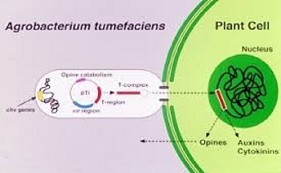
Track-12: Plant Bioinformatics, Proteomics and Data Analysis
The plant co-articulation is another web based database for plant quality investigation. A regular co-communicated quality can produce numerous arrangements of co-articulation information that contain many qualities of enthusiasm for improvement examination. Likewise, co-communicated qualities can be recognized and recorded as far as relative genomics by utilizing the 'Co-articulation quality think about' element. This examination will help translate test information and decide if there is a typical term to those qualities.
- Bioinformatics analysis and challenges
- Use of genomic data for candidate genes
- Identifying novel functional genes
- Application of bioinformatics software for DNA / RNA analysis
- Computational systems for modelling and visualisation of information
- Cloud computing and storage solutions
- Industry applications of the latest genomic technologies
- Collaborations and how they can drive plant research
- Insight into regulatory challenges
- Omics Data integration
- Plant Intearction with Environment
- Quantitative Proteomics
- Plant Development
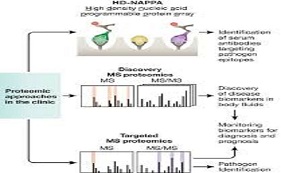
Track-13: Genetically Modified Organisms
A Genetically Modified Organism is a plant, creature, microorganism or other living being whose hereditary cosmetics has been adjusted utilizing recombinant DNA strategies (likewise called quality joining), quality alteration or transgenic innovation. This moderately new science makes precarious mixes of plant, creature, bacterial and viral qualities that don't happen in nature or through customary crossbreeding strategies. GMO is any life form whose hereditary material has been modified utilizing hereditary designing methods (i.e., a hereditarily built living being). GMOs are utilized to deliver numerous solutions and hereditarily adjusted sustenances and are generally utilized as a part of logical research and the creation of different products.
- Genetically Modified Crop
- Genetically Modified Food
- GMO and Environment Interaction
- Genetic Engineering
- Transgenic Plants

Track-14: Arabidopsis
Arabidopsis is a variety in the family Brassicaceae. They are little blooming plants identified with cabbage and mustard. This variety is of incredible enthusiasm since it contains thale cress (Arabidopsis thaliana), one of the model living beings utilized for examining plant science and the primary plant to have its whole genome sequenced. Changes in thale cress are effortlessly watched, making it an exceptionally helpful model.
- Cytogenetics of Arabidopsis
- Genetic Engineering of Arabidopsis
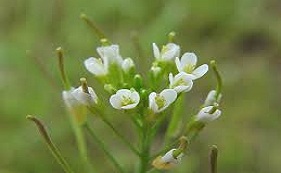
Track-15: Medicinal and Aromatic Plant Sciences
Medicinal and Aromatic plants became a force to be reckoned with due to their profitable biochemical substance, their broad territory of usage and expanding overall exchange volume. Around 60 billion U.S. dollar exchange volume of restorative and fragrant plants in 2000 is required to be 107 billion of every 2017.
- Micropropagation of medicinal and aromatic plants
- Phytochemical Analysis

Track-16: Plant interactions with environment and other organisms
The plant sciences, amid a great part of the twentieth century, advanced as a gathering of controls that looked to disclose plant reactions to variables of the abiotic condition, for example, water, mineral supplements and light. Over the most recent two decades, there have been significant advances in our comprehension of how plants cooperate with a developing rundown of different segments of their biotic condition, including different plants, creature purchasers and detritivores, pollinators, and helpful and pathogenic microorganisms. This advance has rendered a considerably wealthier picture of plant work, in actuality, than the one created by customary models of physiological reactions to straightforward varieties in abiotic factors. At the same time, this advance has uncovered real holes in our comprehension of the development of plant adjustment, the sub-atomic instruments that intervene phenotypic versatility in complex biotic situations, and the biological community outcomes of these cooperations.
- Effect of Biotic and Abiotic stress
- Microbial Ecology
- Plants affecting the soil
- Plant and Microbiome
- Nutrient uptake and plant growth

Track-17: Crop & Pasture Science
Plant vaccination is the way toward initiating normal guard framework show in plant prompted by biotic or abiotic factors. Plants are pre-treated with instigating operators animate plant guard reactions that shape substance or physical hindrances that are utilized against the pathogen intrusion. Inducers utilized for the most part give the signs to stir the plant barrier qualities eventually coming about into instigated foundational protection. In numerous plant-pathogen communications, R-Avr quality cooperations brings about restricted procured protection or easily affected reaction and at distal finishes of plant, an expansive range protection is actuated known as fundamental obtained protection (SAR). Different biotic or abiotic factors instigate fundamental protection in plants that is phenotypically like pathogen-actuated foundational obtained protection (SAR).
- Transgenic plants producing vaccines
- Vaccines given to plants for a healthy vegetation

Track-18: Agronomy and Agricultural Research
Agronomy is the science and innovation of conveying and using plants for support, fuel, fiber, and territory recuperation. Agronomy joins work in the locales of plant inherited characteristics, plant physiology, meteorology, and soil science. Agronomy is the utilization of a blend of sciences like science, science, financial matters, environment, earth science, and hereditary qualities. Agronomists today are incorporated with various issues including making sustenance, making more beneficial support, directing natural impact of cultivating, and focusing essentialness from plants. Agronomists consistently have some mastery in regions, for instance, trim rotate, watering framework and drainage, plant imitating, plant physiology, soil portrayal, soil lavishness, weed control, and bug and vermin control
- Modern technologies for Vegetation
- Agricultural Meteorology
- Seasons and Systems of Farming
- Irrigation and Water Management
- Harvesting and Post harvest Technology
- Agronomy of Field Crops and Biofuel Plants
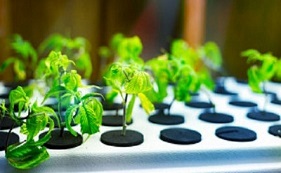
Track-19: Plant Fertilizers and Pesticides
A manure is any material of regular or manufactured inception that is connected to soils or to plants tissues to supply at least one plant supplements basic to the development of plants. Manures upgrade the development of plants. This objective is met in two ways, the customary one being added substances that give supplements. The second mode by which a few manures act is to upgrade the adequacy of the dirt by adjusting its water maintenance and air circulation. Pesticides are substances implied for pulling in, alluring, and afterward pulverizing, or alleviating any bug. They are a class of biocide. The most widely recognized utilization of pesticides is as plant insurance items (otherwise called trim security items), which when all is said in done shield plants from harming impacts, for example, weeds, plant ailments or creepy crawlies. This utilization of pesticides is common to the point that the term pesticide is frequently regarded as synonymous with plant assurance item, in spite of the fact that it is, truth be told, a more extensive term, as pesticides are likewise utilized for non-rural purposes.
- Application of fertilizers & pesticides
- Constraints in biofertilizer technology
- Azolla-Anabena symbiosis
- Biochemical pesticides
- RNAI pesticides
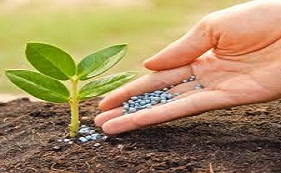
Track-20: Plant Plastics
Plastics produced using biomass, for example, corn, maize, sugarcane bagasse and so forth are known as Bioplastics. These plastics have same physical and synthetic properties as that of general plastics and they keep up full reusing abilities. The biodegradable plastics can be acquired from polyhydroxyalkanoates(PHA) which is significantly gotten from plants and microbes. Microscopic organisms produces Acetyl-CoA compound amid its digestion which is changed over into Polyhydroxy butyryl(PHB) by three biosynthetic chemicals. Use of Bioplastics have empowered critical CO2saving contrasted with ordinary plastics. The sustainable nature and biodegradability of PHA makes them appropriate to supplant manufactured plastic and consequently clears route in the waste administration.
- Gene Splicing
- Biosynthetic Enzymes
- Environmental Impact
- Paving Way in Waste Management

Learn More
Top plant Science & Genomics Universities:
Europe Plant Science & Genomics Universities:
University of California—Davis | Cornell University | Wageningen University and Research Center | Harvard University | Duke University | Ghent University | University of Florida | University of Cambridge | Michigan State University| University of Copenhagen | Swedish University of Agricultural Sciences | University of Minnesota--Twin Cities | University of Wisconsin—Madison| University of British Columbia | University of São Paulo | University of California--San Diego | Iowa State University| University of Arizona |University of Montpellier| Purdue University--West Lafayette | Yale University | Oregon State University | Stanford University| North Carolina State University -Raleigh |University of Illinois--Urbana-Champaign| University of Washington | Utrecht University | University of Helsinki | University of Munich| Aarhus University | University of Freiburg
USA Plant Science & Genomics Universities:
University of Texas—Austin | Kansas State University | University of Missouri | University of Sheffield | University of Aberdeen | University of Leeds | Princeton University | University of Aix-Marseille | University of Bristol | University of Nottingham | Lund University | Technical University of Denmark | Charles University in Prague | University of Bonn | University of Oslo | Virginia Tech | State University of New Jersey--New Brunswick | University of Paris-Sud | University of Groningen | University of Glasgow | University of Pennsylvania | University of Bern | University of St. Andrews| University of East Anglia| University of Padua | University of North Carolina--Chapel Hill | University of Liverpool| University of Nebraska—Lincoln| University of Hamburg| University of Tartu| University of Lisbon| University of Manchester
Asia Plant Science & Genomics Universities:
University of Milan | Vita-Salute San Raffaele University | University of Bologna | University of Rome Tor Vergara | Sapienza University of Rome | University of East Anglia UEA | University of Tennessee | University of Saskatchewan | Montana State University |Pennsylvania State University Milton S Hershey Medical Center | Purdue University | University of Saskatchewan St. Peter's College| University Putra Malaysia | University of Wisconsin – Madison| University of Oxford | University of California, Berkeley | National University of Singapore | University of California, Los Angeles | University of California, San Francisco| Kyoto University | University of Toronto | Columbia University| University of Tokyo| Johns Hopkins University | University of Guelph| University of Reading| China Agricultural University | University of Wisconsin-Madison
Africa Plant Science & Genomics Universities:
The University of Melbourne | University of Western Australia | Warsaw University of Life Sciences – SGGW | University of Natural Resources and Applied Life Sciences Vienna| University of Minnesota| Lincoln University | University of Nebraska-Lincoln | The University of Sydney| University of Georgia | Washington State University| University of Massachusetts Amherst| Bangor University| Chiang Mai University| Estonian University of Life Sciences | Hebrew University of Jerusalem| Hokkaido University | James Cook University | Korea University| Nagoya University | Nanjing Agricultural University | Northwest Agriculture and Forestry University | Rutgers University - New Brunswick | Seoul National University | Stellenbosch University | Tokyo University of Agriculture and Technology | Zhejiang University| Aristotle University of Thessaloniki | Agricultural University | Kyushu University | Laval University
Plant Science & Genomics Societies:
American Society of Agronomy | Crop Science society of America | Soil science Society of America | Genetic Society of America | National Association of plant Breeds | National Science Foundation | National Institute of Plant Genome Research | Australian Society of Plant Science | Royal Society of Plant Genomics | Genetics and Breeding Executive Committee | Federation of European Neuroscience Societies | Institute of Genetics and Developmental Biology Chinese Academy of Science | New Zealand Society of Plant Biologists | Center of Plant Structural and Functional Genomics | Botanical Society of China |Australian Society of Plant Scientists | Australian National University | Argentine Society of Plant Physiology | ARC Centre of Excellence in Plant Energy Biology | American Society of Plant Biologists | African Crop Science Society | Canadian Society of Plant Biologists | Center for Plant Aging Research, Institute of Basic Science | Chilean Society of Plant Biologists | Chinese Society for Plant Biology | Crop Science Society of China | European Plant Science Organization |Federation of European Societies of Plant Biology | Genetics Society of China | International Crop Science Society | Indian Society for Plant Physiology |Japanese Society of Plant Physiologists | Max Planck Institute of Molecular Plant Physiology | New Zealand Society of Plant Biologists | Plant Canada | Portuguese Society of Plant Physiology | Scandinavian Plant Physiology Society | Society for Experimental Biology | Spanish Society of Plant Physiology | Taiwan Society of Plant Biologists | UK Plant Sciences Federation | European Environmental Mutagenesis and Genomics Society | Continental Seed & Chemicals Ltd | Royal Society of Biology
Plant Science & Genomics Conferences:
Europe Plant Science & Genomics Conferences:
International Plant Genomics Conference, Osaka, Japan | Plant Genomics and Gene Editing Conference Netherlands | International Tissue Engineering and Regenerative Medicine Conference , Paris, France | Euro Biotechnology Congress Moscow, Russia | International Tissue Engineering Conference Rome, Italy | Plant Biology Conference Copenhagen, Denmark | International Cell Wall Meeting Cambridge, UK | International Advances in Applied Science and 2018 Environmental Engineering Conference Malaysia | International Molecular Markers in Horticulture Conference Napier, New Zealand | International Plant Biotechnology and Agriculture Congress Kayo Guillermo, Cuba | New Breeding Technologies in the Plant Sciences Gothenburg, Sweden | International Legume Genetics and Genomics Conference, Hungary
USA Plant Science & Genomics Conferences:
International Plant Science and Genomics Conference Montreal, Canada | International cell and Gene Therapy Conference London, UK| International Genomics and Molecular Biology Conference Barcelona, Spain | International Bioscience Conference Vienna, Austria | International Tissue Engineering Conference Atlanta, Georgia ,USA | Annual Cell Metabolism Summit Philadelphia, USA | International Genomics and Pharmacogenomics Conference Philadelphia, USA | Biotechnology Congress Boston, USA | International Genomics and Bioinformatics congress Ohio, USA | Plant Signaling Conference CA, USA | Gordon Research Conference CA, USA | International Plant Vascular Biology Conference Pacific Grove, CA, USA | International Hazelnut congress Samsun | American Plant Phenotyping for Plant Breeding Conference Sao Carlos, Brazil
Plant Science & Genomics Companies:
Europe Plant Science & Genomics Companies:
Paragon Genomics | Gene Works | Fusion Genomics | Ambry Genetics | One Lambda | Biopsied Technologies | Predictive Biology | Sure Genomics | Wafer Gen Biosystems | Illumina | Neo Genomics | Prove Biosciences | Singlera Genomics | S2 Genomics Epinomics | Quanta pore | Synthomics |Cellecta | Bio nexus | Fabric Genomics | 10X Genomics | Genapsys Agena Bioscience | Cypher Genomics | Eton Bioscience | Helix | Molecular Assemblies | Phalanx Biotech | Retrogene | iGenomX | Blueprint Genetics | Invitae | NGX Bio | Sci Genome | Celemics | U Biome | Dovetail Genomics | Encoded Genomics | Mission Bio
USA Plant Science & Genomics Companies:
Vectalys | Sciomics | Cento gene | Omixon | Precision Biomarker Resources | Xcelris Genomics | Med Genome |Mapmygenome | ERS Genomics | Genomics Medicine Ireland | Dante Labs | Takara Bio | Enzymatic | Seqwell | Raindance Technologies | ORIG3N | Claritas Genomics | Genometry | GenoSpace | GnuBIO | ReadCoor | 1CellBiO | ZS Genetics | Persomics | Kapa Biosystems | Aline Biosciences | SeqLL | BRT Laboratories | Key Gene | Sequenom | Precision Biosciences | Real Time Genomics | GenScript | Empire Genomics | GenePeeks | Sema4 Genomics | SolveBio | DNA Diagnostics Center | Assurex Health | Ranomics | Floragenex | Diffinity Genomics | HeartGenetics | Nabsys | Igen Biotech | Saphetor | Sophia Genetics
Middle East Plant Science & Genomics Companies:
Complement Genomics | Lineagen | Taueret | Blue Heron Biotech | Iverson Genetics | Stratos Genomics | Lucigen | RPRD Diagnostics | AccuGenomics Inc | AgBiome Inc | Almac Diagnostics LLC | ArrayXpress Inc | AsystBio Laboratories LLC | Attagene Inc | BASF Corp | Bayer | BD Technologies | BioDeptronix LLC | BioGenomics LLC | bioMONTR Labs | BioTrackers Inc | Cell Microsystems Inc | Celldom Inc |Celplor LLC | Charlotte Research Institute | Cotton Incorporated | Covance Inc | David H. Murdock Research Institute | Duke Center for Genomic and Computational Biology | Element Genomics Inc | EntoGenetics Inc |EpiCypher Inc | Eton Bioscience Inc | Foundation Medicine Inc | GEM Tox Consultants & Labs Inc | General Biosystems Inc | General Mills Agricultural Research | Genetron Health Technologies Inc | GENEWIZ Inc | Genoverde Biosciences Inc | Healthspan Diagnostics LLC | Icagen Inc | IngateyGen LLC | Inivata Inc |Innatrix Inc | Integrated Laboratory Systems Inc | InTox Biotech | LabCorp - Center for Molecular Biology and Pathology
Asia Plant Science & Genomics Companies:
Locus Biosciences Inc | Max Genomics LLC | MDxHealth Inc |MultiGEN Diagnostics LLC | NanoMedica LLC | NCSU Technology Incubator | Nutrition Research Institute - UNC-CH | Ocis Biotechnology Inc | Omicsoft Corp | Pastoor Science Communications LLC | Personalized Medicine Partners LLC | Phytonix Corp |Precision Biosciences Inc | Premex Innovation Labs | Q² Solutions | Renaissance Computing Institute | Ribometrix Inc | RiboWiz Scientific Inc | SciOme LLC | ScitoVation LLC | Select ImmunoGenomics Inc | SenGenix Inc | Sentinel Biomedical Inc | Syngenta Crop Protection LLC | TIRF Labs | TransViragen Inc | Novogene | Congenica | Laboratory Corporation of America | Zeptosens | Zengen | Zealand Pharma | Xcellsyz |Xcelris | Vita Genomics |Virinova | Valentis | Unigene | ThinkGen | Tranzyme |TaKaRa Zhuzo | Rosetta Genomics | Ribomed | Research Genetics | Renovis | Prolexis | Primal | Plexxikon | Phylogeny
Plant Science & Genomics Jobs:
Plant Genomics jobs in Europe:
Structural Variation Discovery Platform | Program Specialist, EDF Climate Corps | Monsanto Global Crop Protection Portfolio Intern | Product Developer - Research & Development | Food Solutions Customer Development | Research & Development Internship | Lead Breeding Program Review | Research Technician | Research Geneticist (Postdoctoral Fellow) |Assistant Project Scientist/Coaker lab |AgCenter Assistant/Associate Professor | Bioinformatics/Molecular Biologist |Research Geneticist (Research Associate) | Laboratory Technician, Niyogi Lab | Research Geneticist Plants (Postdoctoral Research Associate) | Assistant Research Scientist | Student Trainee (Office Automation) | Assistant Professor, Bioinformatics | Research Technician | Assistant Professor | Research Scientist, Molecular Biology | Research Scientist | Assistant/Associate Professor in Plant Breeding and Genetics |Laboratory Technician | Staff Scientist | Staff Research Associate, IGI
Plant science & Genomics Jobs in USA:
Assistant Professor (Weed Science Extension) | Postdoctoral Research Associate | Associate Investigator - Research Associate | Molecular or Cellular Biologist - New Energy Technology - Mu... | Breeding Program Optimization Lead/Specialist | AgCenter Research Associate | Research Associate-Fixed Term | Title Research Associate | Associate Breeder - Corn Silage Research | Post Doc Research Scholar | Graduate Research Assistantship | Production Specialist - Polyethylene Slurry Technology | Research Associate, Applied Breeding Technologies and Genomics | Breeding Program Management Lead/Specialist | Food Technologist/Engineer | Production Worker C_5401 | Title Conversion Manager/Breeder | Warehouse Operator--Dannon West Jordan | Research Scientist of Plant Pathology | General Mechanic Job |Senior Food Scientist (Snacks) | Field Office Administrator III | Research Intern - Seed Science (Johnston, IA) | Field Research Intern (Champaign, IL) | Assistant Traits Project Lead - Biotic Stress | Research Molecular Biologist (Research Associate)
Plant Science & Genomics Jobs in Asia:
Lab Technician | Assistant Professor, Genomics and Bioinformatics | Computational quantitative genetics postdoc position | Computational Geneticist | Post-BA Research Assistant in Biology (Laskowski lab) | R&D District Farm Manager | Patent Scientist | Field Research Co-Op - 6 Month (West Memphis, AR) | Sr. Manager/Director Environmental, Health & Safety | Postdoctoral Fellow | Director of Crop Innovation | Conservation Research Assistant/Coordinator | Statistical Scientist | Postdoctoral Scholar Quantitative Genetics and Genomics Department of Plant | Plant Production Technician | Biologist/Computer Scientist (Bioinformatician) | Assistant/Associate Professor in Grape Disease Ecology and Epidemiology | Plant Operations Manager | Safety Supervisor | Soil and Hydro Technical Specialist | Research Geneticist (Postdoctoral Fellow) | Plant Breeding Director | Assistant Professor of Plant Secondary Metabolites and Human Health | Sales Agronomist | Field Research Co-Op (Brookings, SD) | Seed Breeder / Agronomist |Global Germplasm IP Operations Specialist | Plant Maintenance Supervisor-Night Shift | Post-Doct Research Assoc, Plant Sciences
Plant Science & Genomics Journals:
American Journal of Plant Sciences | Global Health Journals | Journal of Health Policy and Outcomes Research | International Journal of Plant Genomics | Frontiers Plant Genetics and Genomics | Journal of Plant Genomics | Bio info Publications | Agribiotech Journals | Elsevier | International Journal of Genomics | SCI Journal of plant Genomics | Journal of Medical Science and Clinical Research | International Journal of Genomics and Data Mining |Journal of Informatics and Proteomics | Journal of Functional and Integrative Genomics
Plant Science & Genomics Products:
Functional Genomics Screening Workflow | Electrostatic Spraying Systems | Automation Tips | Genomics Sample Prep Solutions | Microcentrifuge Tubes | Molecular Biology Equipment | PCR Consumables | Pipet Tips | Sealing Solutions | Storage | DNA Markers | Magnetic Separation Devices | Nucleic Acid Purification Kits | Ion Torrent | Lyophilization and Tissue Grinding | Customized NGS library construction | Qiagen BioSprint 96 high-throughput DNA/RNA extraction system | Eppendorf AF2200 Plate Reader | Agilent Bioanalyzer
Market Analysis
Market Analysis for Plant Science and Genemoics
Importance and scope
Plant science and genomics is a mounting and always advancing field of study, one which has increased much ground in past years through the improvement of cutting edge research and information administration instruments. Master scientists investigate the present issues and systems of this growing field, particularly tending to regions of quality revelation and the utilitarian examination of qualities with an objective on the essential devices and sub-controls of hereditary mapping, mRNA, protein and metabolite profiling. Plant genomics utilize energizing new strategies to examine sub-atomic plant rearing innovation and quality utilitarian investigation by means of change, transformation, protein capacity, and quality articulation. The achievement of transgenic crops has eradicated the last remnants of uncertainty about the estimation of horticultural biotechnology and activated huge scale interests in plant genomics. The principal genomics innovation that was honed on an expansive scale was sequencing the 5′ closures of cDNAs, to deliver communicated succession labels (ESTs).
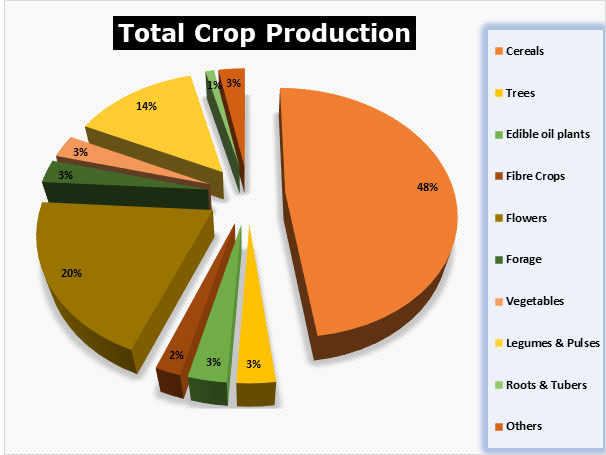
Plant Science and Genomics has establishes in horticulture and Plant Genomics likewise has scope in agribusiness fields, solution, sustenance creation and materials. It is the fundamental wellspring of nourishment for person. And in addition we can get plant proteins, phytochemicals from plants, from therapeutic plants a few pharmaceuticals are readied, and which can fix some deadly infections. Frame some ongoing investigation it is demonstrated that plant cell reinforcement encourages us to shield from free radical harm. By utilizing Phytochemicals some disease cell expansion can be forestalled at before arrange. Alongside that we can build the nourishment estimation of plant by plant biotechnology and plant reproducing. Presently days efficient power vitality is utilized as non-traditional wellspring of vitality to decrease ecological contamination. In this way, in human life Plant Genomics and plant-situated investigations are especially imperative to maintain in this planet.
Value of Plant science & genomics to Agriculture and Society
Plant science and Genomics will quicken the use of quality innovation to agribusiness. This innovation will improve sustenance security, by expanding efficiency, and nourishment wellbeing, by taking out Mycotoxins. There is a third advantage, got from the initial two: expanded riches. By quickening the use of innovation, genomics fundamentally expands the estimation of seeds and rural items. This expansion adds many riches to the clients, organization proprietors, representatives, and residents of the countries in which hereditary supply organizations work, and to both creating and bringing in countries whose nourishment costs thus are diminished.
Agrarian plant science and genomics ought to be openly supported for a few reasons. To begin with, the DNA arrangement of plants is essential for proceeded with minimal effort, quick advance to comprehend crops. Thusly, it is a fundamental asset for researchers in both the general population and private divisions. Second, industry needs general society part to make imaginative strategies for organizing and breaking down databases, which isn't possible without access to genomics assets. Third, genomics is an equalizer in the exploration world.
This conference focuses broadly on molecular biology, cellular biology, microbiology, Mycology, physiology, biochemistry, genetics, development, bioinformatics, molecular evolution, plant pesticides and fertilizers.
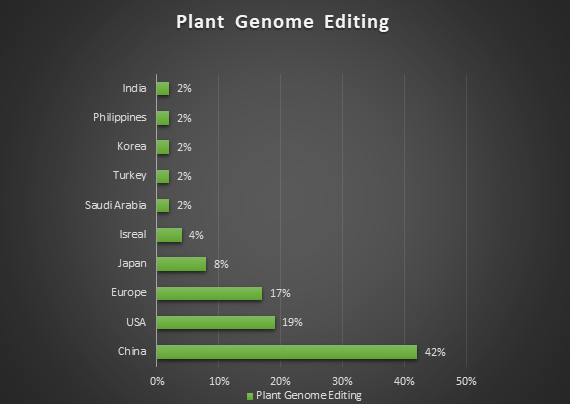
Why Amsterdam?
Amsterdam is business capital of the Netherlands and one of the best monetary focuses in Europe, Amsterdam is viewed as an alpha world city by the Globalization and World Cities (GaWC) think about gathering. The city is likewise the social capital of the Netherlands. Numerous extensive Dutch establishments have their central station there, and seven of the world's 500 biggest organizations, including Philips, AkzoNobel, TomTom and ING, are situated in the city Also, numerous driving innovation organizations have their European home office in Amsterdam, for example, Uber, Netflix and Tesla. In 2012, Amsterdam was positioned the second best city to live in by the Economist Intelligence Unit (EIU) and twelfth all around on nature of living for condition and foundation by Mercer. The city was positioned third in advancement by Australian development office 2thinknow in their Innovation Cities Index 2009.
Market Growth
The worldwide Plant science & Genomics advertise has been esteemed at USD 13.45 Billion out of 2016 and is relied upon to develop at a CAGR (Compound Annual Growth Rate) of 10.2% to reach to USD 24.06 Billion by 2022. The development of the general market for genomics can be ascribed to the developing interest for customized drug, developing ventures, concedes, and finances by the administration; ascend in look into exercises in the field of genomics; expanding number of new businesses; and expanding utilization of genomic sequencing in the diagnostics. In the coming years, North America is required to represent the biggest offer of the worldwide Genomics advertise. Base year considered for the report is 2016 and the conjecture time frame incorporates 2017– 2022.
